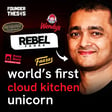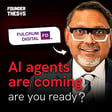
Policybazaar: Growth, IPO & Future Bets | Tarun Mathur
"If you're going to find something, think of building this for the next 20 years. Think very long term."
This powerful advice from Tarun Mathur underscores the importance of long-term vision in entrepreneurship, reminding founders that enduring companies aren't built overnight but over decades.
Tarun Mathur is the Co-Founder & Chief Business Officer at Policybazaar for Business, India's leading online insurance marketplace. With an impressive 17-year journey since co-founding the company in 2008, Tarun has been instrumental in its growth, including the launch and leadership of its B2B arm, Policybazaar for Business. His experience spans analytics, revenue management, strategic initiatives, and various insurance verticals within the company.
Key Insights from the Conversation:
👉Mission-Driven: Policy Bazaar was founded with a mission to protect middle-class India through transparent, accessible insurance, focusing initially on term life insurance.
👉Evolving Sales Model: Realizing insurance is a complex purchase, Policy Bazaar shifted from a purely digital model to an assisted one, incorporating call centers and advisors to build trust and aid understanding.
👉Product Focus: While starting with auto insurance, the focus evolved to high-importance protection products like health and term life insurance, educating the market along the way.
👉B2B Expansion: PolicyBazaar for Business targets the underserved SME/MSME sector, offering protection products like liability, cyber, and group health insurance, tailored to business needs.
👉Data-Led Product Innovation: Customer conversations and claims data are rigorously analyzed to improve user experience, develop relevant product propositions, and refine pricing with insurance partners.
👉Building for the Long Haul: Success stems from a long-term vision, customer obsession, focusing on product proposition, and consistently showing up over many years.
Chapters:
00:00:00 - Intro: Tarun Mathur's Origin Story
00:06:43 - The Genesis of Policy Bazaar
00:12:00 - Early Challenges & Securing Funding
00:15:37 - Selling Insurance Digitally: The Pivot to Assisted Sales
00:19:03 - Understanding Insurance Distribution Models (Agent vs Broker)
00:25:34 - Evolution of Product Mix: Auto, Health & Term Life
00:35:08 - Building Policy Bazaar for Business (B2B)
00:45:54 - The Cyber Insurance Opportunity & Product Innovation
00:55:48 - B2B vs B2C Customer Acquisition Strategy
01:00:45 - The Journey to IPO
01:04:14 - Entering the Reinsurance Market
01:23:28 - Policy Bazaar's Secret Sauce: Customer Obsession
01:35:42 - Advice for Young Founders
#FounderThesis #Insurtech #InsuranceIndia #StartupIndia #IndianStartups #Entrepreneurship #AkshayDatt #Fintech #DigitalInsurance #B2B #SME #MSME #TermInsurance #HealthInsurance #CyberInsurance #IPO #BusinessStrategy #CustomerObsession #ProductManagement #DataAnalytics #Leadership #StartupAdvice
Disclaimer: The views expressed are those of the speaker, not necessarily the channel.



















